[article still being drafted]
Palestine's ancient origins
Neighbours Israel and Palestine share long overlapping convoluted histories dating back to the ancient Canaanites, Egyptians, Hittites and Hebrews. Successive wars and empires saw control and power in the region change many times and also the territorial divisions by the conquerors. Might has ruled and been the recurring theme shaping the borders, not unlike other places of human occupation world over.
http://www.palestinehistory.com/history/brief/brief.htm#02
The Palestinian people are an Arabic-speaking ethnic group of mainly Muslim faith, which have been found to be closely related to Jews and represent modern "descendants of a core population that lived in this Asia Minor area since prehistoric times. The first widespread use of "Palestinian" as an endonym to refer to the nationalist concept of a Palestinian people by the local Arabic-speaking population of Palestine began prior to the outbreak of World War I, and the first demand for national independence was issued by the Syrian-Palestinian Congress on 21 September 1921.
Jewish history of persecution
Jewish history is ancient, emanating from the nearby Fertile Crescent and Canaan and a legacy of migration throughout what was once Asia Minor including Palestine. Since the Roman Empire, Jews have been persecuted, enslaved or forced to flee tyranny. Jews became scattered throughout the Roman Empire which included now Europe, becoming a homeless 'diaspora' (a displaced population sharing a common identity) connected by creed. http://en.wikipedia.org/wiki/Jewish_history#The_diaspora
From the 16th Century until World War 1, the Ottoman Turks of Asia Minor ruled Palestine.
http://www.palestinehistory.com/history/brief/brief.htm#02
Out of Europe's French Revolution, the Napoleonic Wars and the new wealth of the Industrial Revolution and the colonialism that it fed, by the 19th Century nationalism was sweeping Europe and saw the emergence of 'new imperialism' driven mainly by Britain, France and Germany. "The period is distinguished by an unprecedented pursuit of what has been termed "empire for empire's sake," aggressive competition for overseas territorial acquisitions and the emergence in some colonizing countries of doctrines of racial superiority which purported to explain the unfitness of backward peoples for self-government." http://en.wikipedia.org/wiki/New_Imperialism
In this nationalistic fervour, Jews, being distinguishable from European cultures (notably by religion, customs, appearance, and work ethic) were not seen as part of the nationalistic ideals and so continued to be outcast. In the face of continuing persecution, the Jewish diaspora increasingly sought a homeland and became more galvanised as an ethnic group.
In 1894, Jewish persecution in Europe culminated in the Dreyfus Affair, in which a French Jewish army captain was falsely convicted of spying for Germany. It became an inciteful anti-Jewish incident where many chanted "Death to the Jews!" This was symptomatic of the growing anti-Jewish sentiment across Europe which saw the emergence of Theodor Herzl, an Austro-Hungarian journalist and Jew. At this time Herzl grew to believe that anti-Semitism could not be defeated or cured, only avoided, and that the only way to avoid it was the establishment of a Jewish state, the tenet for political Zionism.
In Der Judenstaat, Herzl wrote:
“The Jewish question persists wherever Jews live in appreciable numbers. Wherever it does not exist, it is brought in together with Jewish immigrants. We are naturally drawn into those places where we are not persecuted, and our appearance there gives rise to persecution. This is the case, and will inevitably be so, everywhere, even in highly civilised countries—see, for instance, France—so long as the Jewish question is not solved on the political level. The unfortunate Jews are now carrying the seeds of anti-Semitism into England; they have already introduced it into America."
http://en.wikipedia.org/wiki/Theodor_Herzl
Jewish desire for a homeland
In 1897 the first Zionist Congress was held in Basel, Switzerland deciding to establish a national home for Jews in Palestine. Argentina was another proposition, but in 1906 a subsequent Zionist congress returned to the idea that a Jewish homeland should be in Palestine. By 1914 with the outbreak of World War I, Jews in Palestine had steadily increased from 12,000 in 1845 to 85,000.
During the course of World War I (The Great War) commencing in 1915, with the Ottoman Turks of Asia Minor ruling Palestine and it sided with the German central powers. Since this alliance threatened Britain's communications with India via the Suez Canal, besides other strategic interests of the allies, Britain promised the Arabs the independence of Arab lands under Ottoman rule in return for Arab support against Turkey.
In an controversial exchange of letters between British High Commissioner Henry McMahon and Arabian Shareef Husein ibn Ali of Mecca (known as the McMahon–Hussein Correspondence), the Arabs were assured that their assistance would be rewarded by an Arab empire encompassing the entire span between Egypt and Persia, but according to the British version, only west of "Damascus, Homs, Hama and Aleppo" since the British considered the area "to be purely Arab". The Arabs had a different account of the verbal early honourary promises made by McMahon that included Palestine.
Later during the Great War in November 1917 the British government issued the Balfour Declaration to a British Zionist leader from the foreign secretary Arthur J. Balfour promising him the establishment of a national home for the Jewish people in Palestine.
With the help of the Arab Revolt against the Turks, the British defeated the Ottoman forces in the region in 1917-18. Lord Balfour stated at the Paris Peace Conference in 1919 that the Allies were committed to Zionism and had no intention of honoring their promises to the Arabs.
Eighty-five years later, in a 2002 interview with The New Statesman, British Foreign Secretary Jack Straw observed "A lot of the problems we are having to deal with now, I have to deal with now, are a consequence of our colonial past. .. ..The Balfour Declaration and the contradictory assurances which were being given to Palestinians in private at the same time as they were being given to the Israelis - again, an interesting history for us but not an entirely honourable one."
http://en.wikipedia.org/wiki/Sykes%E2%80%93Picot_Agreement
After WWI, under the 'Palestine Mandate', Britain occupied and administered the Palestine region, which was formalised by the League of Nations in June 1922, continuing until 1948.
Palestine during the next twenty five years came under direct British rule in order to give effect to the Balfour Declaration with the aim of establishing Palestine as the national home of the Jewish people. The mandate was effectively a self-imposed sovereignty by the British over the conquered territory of Palestine. The mandate was a legal and administrative instrument supposed to be achieved without prejudicing the civil and religious rights of existing non-Jewish communities in Palestine.
http://en.wikipedia.org/wiki/Mandate_Palestine
The area of the Mandate was originally 118,000 km2. In 1921, Britain took the 91,000 km2 east of the Jordan River, and created Trans-Jordan (later the Arab country of Jordan) as a new Arab protectorate. In 1923, Britain ceded the Golan Heights (another 1,176 km2 of the Palestine Mandate) to the French Mandate of Syria. The total remaining area of the Mandate for Palestine, after these land deductions, was just under 26,000 km2. The balance of the Mandate, the inhabited part of Palestine, and only the part west of the Jordan, was just 14,000 km2.
Racial violence between Palestinians and Jews grew and culminated with the 1920-21 Arab riots as a consequence of the wave of Jewish immigration and the problematic British administration. Following the ongoing racial tension and an investigation into the riots, the British Government issued an official manifesto, referred to as the White Paper of 1922.
The White Paper stated that Britain stood by the principles of the Balfour Declaration to facilitate a Jewish homeland in Palestine, but did not support a separate nation as a Jewish National Home, only a continuation of the community within the larger Palestine region.
The White Paper stated:
"it is contemplated that the status of all citizens of Palestine in the eyes of the law shall be Palestinian, and it has never been intended that they, or any section of them, should possess any other juridical status."
This made British rule of Palestine contradictory and unworkable. Then in July 1922 the British partitioned the area of the Palestine Mandate by excluding the area east of the Jordan River from Jewish settlement. That land, 76% of the original Palestine Mandate land, was renamed Transjordan and was given to the Emir Abdullah to rule.
The 'Arab uprising' of 1936-1939 was followed by the 1939 White Paper that imposed severe restrictions on Jewish immigration to Palestine. A limit of 75,000 Jewish immigrants was set for the five-year period 1940-1944 and it effectively reversed teh principle of the Balfour Declaration.
During World War II, the persecution of the Jews by Nazi Germany was unprecedented in the Holocaust involving the genocide of approximately six million European Jews under a programme of systematic state-sponsored extermination. Many Jews desperately fled Europe during the war and went to the United States. Many also went to Palestine, despite the British immigration limits there. By 1945 Britain was still limiting Jewish immigration into Palestine.
Anglo-American Committee of Inquiry
After WWII, the Anglo-American Committee of Inquiry was set up jointly between Britain and the United States to review the policy on Jewish immigration to Palestine, especially in the wake of the Nazi Holocaust, and to consider the future government of Palestine.
The Committee recommended the immediate admission of 100,000 Jewish refugees from Europe into Palestine. It also recommended that Palestine remain a mandated territory, that facilities be put in place to ensure Jewish migration and that the 1940 Land Act which banned Jews from purchasing land in 95% of Palestine be rescinded.
It recommended the following principles :
I. That Jew shall not dominate Arab and Arab shall not dominate Jew in Palestine.
II. That Palestine shall be neither a Jewish state nor an Arab state.
III. That the form of government ultimately to be established, shall, under international guarantees, fully protect and preserve the interests in the Holy Land of Christendom and of the Moslem and Jewish faiths.
Thus Palestine must ultimately become a state which guards the rights and interests of Moslems, Jews and Christians alike; and accords to the inhabitants, as a whole, the fullest measure of self-government, consistent with the three paramount principles set forth above.
The effect of the Committee’s findings was that the US refused to recognise most of its findings except for supporting the 100,000 refugee intake, which threatened to provoke an Arab uprising. A compromise was reached and from October 1946 1,500 Jews were allowed into Palestine every month.
1947 UN Partition of Palestine
In 1947 Britain decided to transfer the Palestine problem it had created to the United Nations. On 29th November that year, the United Nations Partition Plan for Palestine or United Nations General Assembly Resolution 181 (II) Future Government of Palestine was adopted. The resolution recommended the termination of the British Mandate for Palestine and the partition of the territory into two states, one Jewish and one Arab, with the Jerusalem-Bethlehem area being under special international protection, administered by the United Nations.
The resolution also contained a plan for an economic union between the proposed states, and a plan for the protection of religious and minority rights. The resolution sought to address the conflicting objectives and claims to the Mandate territory of two competing nationalist movements, Zionism (Jewish nationalism) and Arab nationalism, as well as to resolve the plight of Jews displaced as a result of the Holocaust.
The resolution called for the withdrawal of British forces and termination of the Mandate by 1 August 1948, and establishment of the new independent states by 1 October 1948. A transitional period under United Nations auspices was to begin with the adoption of the resolution, and lasting until the establishment of the two states.
The proposed plan was accepted by the leaders of the Jewish community in Palestine, through the Jewish Agency. However, the plan was rejected by leaders of the Arab community.
The passing of the UN resolution marked the start of the 1948 civil war in Palestine.
With no plan for a smooth transition of authority to a new administration, Britain announced its intention to unilaterally withdraw from Palestine by 15 May 1948. During their withdrawal, the British refused to hand over territory or authority to any successor. On the day before Britain was to complete its withdrawal, (i.e. 14 May 1948) the Jewish community in Palestine published a Declaration of Independence as the State of Israel, and five Arab armies crossed into the former Mandate as the start of the 1948 Arab–Israeli War.
And so we have the Israeli-Palestinian conflict continuing to today, sixty odd years and three generations later.

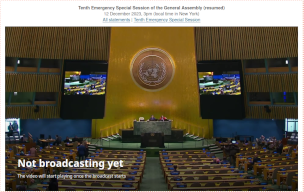
 Yesterday, on 8 December 2023, Miko Peled, spoke at a public meeting about Israel's murderous war against Gaza, which commenced over two months ago on 7 October and the broader context of the history of the Palestine/Israel conflict going back more than 75 years. Much of what he said from his own personal experience. The meeting was held in the public library of Bethlehem in the US state of New York.
Yesterday, on 8 December 2023, Miko Peled, spoke at a public meeting about Israel's murderous war against Gaza, which commenced over two months ago on 7 October and the broader context of the history of the Palestine/Israel conflict going back more than 75 years. Much of what he said from his own personal experience. The meeting was held in the public library of Bethlehem in the US state of New York. "The horror and trauma children are facing in Gaza right now is indescribable and unconscionable - suffering and killing must stop now." (Plan International Australia, 6 December 2023)
"The horror and trauma children are facing in Gaza right now is indescribable and unconscionable - suffering and killing must stop now." (Plan International Australia, 6 December 2023)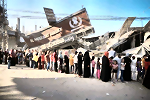 Geneva - Israel has expanded its total ban on humanitarian supplies entering large areas of the Gaza Strip as part of its ongoing genocide, waged since 7 October,
Geneva - Israel has expanded its total ban on humanitarian supplies entering large areas of the Gaza Strip as part of its ongoing genocide, waged since 7 October,  The following article has been adapted from a double-sided A4 leaflet which was handed out at a protest for Palestine, which commenced from Queen's Park in the Brisbane CBD at 2pm on Sunday 26 November. The 344K PDF file is attached
The following article has been adapted from a double-sided A4 leaflet which was handed out at a protest for Palestine, which commenced from Queen's Park in the Brisbane CBD at 2pm on Sunday 26 November. The 344K PDF file is attached  The included photograph shows a Palestinian boy moments before he died after he and his people were deliberately targeted by the Netanyahu regime. I captured it from Facebook after assuring Facebook that I could handle the image having read through their warning about how distressing it might be for me. (Unfortunately, I did not bookmark the post, so I cannot link to the original.)
The included photograph shows a Palestinian boy moments before he died after he and his people were deliberately targeted by the Netanyahu regime. I captured it from Facebook after assuring Facebook that I could handle the image having read through their warning about how distressing it might be for me. (Unfortunately, I did not bookmark the post, so I cannot link to the original.)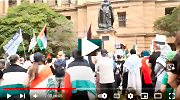 Palestine-born and trained doctor who, at 12 yrs old, was shot in the neck by a sniper on his way home from school, speaks of then and now at a pro-Palestinian rally in Brisbane on 19 November 2023. The rally was very large and a later march took up several blocks, where numerous groups of supporters lined the footpaths. People are aghast, shocked, disturbed, at the failure by world leaders to heed the suffering and extinction of so many people in Gaza, in full view, 24/7.
Palestine-born and trained doctor who, at 12 yrs old, was shot in the neck by a sniper on his way home from school, speaks of then and now at a pro-Palestinian rally in Brisbane on 19 November 2023. The rally was very large and a later march took up several blocks, where numerous groups of supporters lined the footpaths. People are aghast, shocked, disturbed, at the failure by world leaders to heed the suffering and extinction of so many people in Gaza, in full view, 24/7.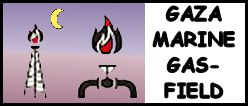 With the exception of some members of the cross-bench, mostly Greens, both Australia's houses of Parliament support Israel's war against more than 2 million Palestinians (who are also mostly Israeli citizens) crowded into the Gaza strip.
With the exception of some members of the cross-bench, mostly Greens, both Australia's houses of Parliament support Israel's war against more than 2 million Palestinians (who are also mostly Israeli citizens) crowded into the Gaza strip. "The West Bank already started to be destroyed
"The West Bank already started to be destroyed The modern history of Israel and Palestine has well-documented beginnings in the not so long ago. Of course, if you go back to the Ottoman Empire, the current responsibilities fade. And before then, biblical times. The greatest paradox is perhaps that, if people have the power to get something they really want, and can defend it, ultimately they own it, but they also own the consequences.
The modern history of Israel and Palestine has well-documented beginnings in the not so long ago. Of course, if you go back to the Ottoman Empire, the current responsibilities fade. And before then, biblical times. The greatest paradox is perhaps that, if people have the power to get something they really want, and can defend it, ultimately they own it, but they also own the consequences. On Thursday 2 November, staff, students and alumni of The University of Melbourne published an
On Thursday 2 November, staff, students and alumni of The University of Melbourne published an  The video from Twitter, which is embedded below, shows a young Israeli woman express her opinion that Israel's past and present treatment of Palestinians is unjust and how Prime Minister Netanyahu's current attempt, through mass murder by aerial bombardment, to ethnically cleanse the Gaza strip of its Palestinians, is morally repugnant.
The video from Twitter, which is embedded below, shows a young Israeli woman express her opinion that Israel's past and present treatment of Palestinians is unjust and how Prime Minister Netanyahu's current attempt, through mass murder by aerial bombardment, to ethnically cleanse the Gaza strip of its Palestinians, is morally repugnant. The Head of the United Nations Relief and Works Agency for Palestine Refugees in the Near East (UNRWA), Philippe Lazzarini, said, "the call of the Israeli forces to move more than 1 million civilians living in northern Gaza within 24 hours is horrendous" and will lead to "an unprecedented level of misery."
The Head of the United Nations Relief and Works Agency for Palestine Refugees in the Near East (UNRWA), Philippe Lazzarini, said, "the call of the Israeli forces to move more than 1 million civilians living in northern Gaza within 24 hours is horrendous" and will lead to "an unprecedented level of misery."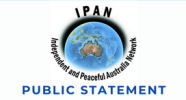 The Independent and Peaceful Australia Network calls on the Australian Government to stop its support of the Israeli occupation and condemn the theft of Palestinian homes and land by Israel.
The Independent and Peaceful Australia Network calls on the Australian Government to stop its support of the Israeli occupation and condemn the theft of Palestinian homes and land by Israel. Previously published on the
Previously published on the 
Recent comments